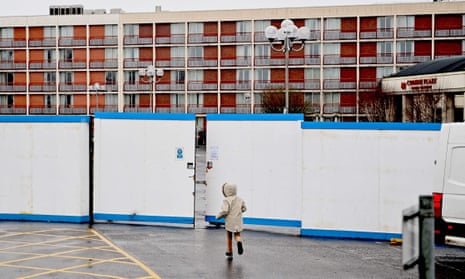Asylum seekers who complain about poor conditions in Home Office hotels have been threatened with being sent to Rwanda, according to a new report.
The report from the charity Refugee Action, entitled Hostile Accommodation: How the Asylum System Is Cruel By Design, is based on 100 in-depth interviews with asylum seekers in hotels in London, Manchester, West Midlands and Bradford.
It includes interviews with single adults and families, detailed casework records relating to problems in hotels and other asylum accommodation, and freedom of information requests to council environmental health departments.
The report says that on top of being told not to complain about poor conditions or face removal to Rwanda, asylum seekers were also told that if they complained about the quality of food served to them the police would be called. They were also told they were forbidden from taking photos of the food to provide evidence of its quality, the report says.

The report calls the system of accommodating asylum seekers – with more than 50,000 currently in hotels – “a nationwide system of racialised segregation and de facto detention”.
Asylum seekers are being housed in hotels for increasingly long periods. One in three adults and more than one in four families with children are in hotels for more than a year. In one case a family of six lived in one room for more than a year. The report warns that if the new immigration bill now going through parliament is implemented, the situation will worsen.
Concerns highlighted in the report include that:
More than half complain of overcrowding, a lack of privacy and having to spend more than six months living in a hotel. Some single adults have spent more than two and a half years in hotels.
Three-quarters have reported low quality or inappropriate food and say they are facing hunger or malnutrition. A similar number are facing mental health problems.
The majority of asylum seekers the charity is supporting are people of colour.
There are numerous cases of mothers unable to continue breastfeeding because they have become malnourished due to hotel food. Some children have lost weight.
A third of families say their children have been unable to access education.
The report highlights individual cases including a wheelchair user trapped on the 11th floor of a hotel with a dysfunctional lift, and an accommodation contractor who urged a GP not to write a health support letter for an asylum seeker advocating for a transfer as it could put pressure on the contractor’s accommodation system.
Pest and rodent infestations were common along with damp, mould and flooding. There have also been instances of ceilings collapsing with one woman holding a baby and a child taken to hospital in two separate incidents after ceiling collapses.
after newsletter promotion
Twenty seven councils responded to FoI requests about environmental health officer callouts to asylum accommodation, and revealed hundreds of calls about conditions in asylum accommodation in areas including Swansea, Bradford, Derby and Liverpool.
Refugee Action is calling on government to fund councils and NGOs to provide accommodation and support instead of the current group of private contractors who make millions of pounds in profit out of Home Office contracts.
Tim Naor Hilton, chief executive of Refugee Action, said: “The government is running a system of de facto detention – holding and segregating people seeking asylum in accommodation that is harming their mental and physical health. This demoralising and brutal system costs the taxpayer millions per day but creates huge profits for contractors who are too often failing to make their housing habitable.”
A Home Office spokesperson said: “We do not recognise the claims in the report suggesting hospitalisations, threats of deportation or restriction of movements, but where concerns are raised about any aspect of the service delivered by the hotel we work with the provider to ensure they are addressed in a timely manner.”
